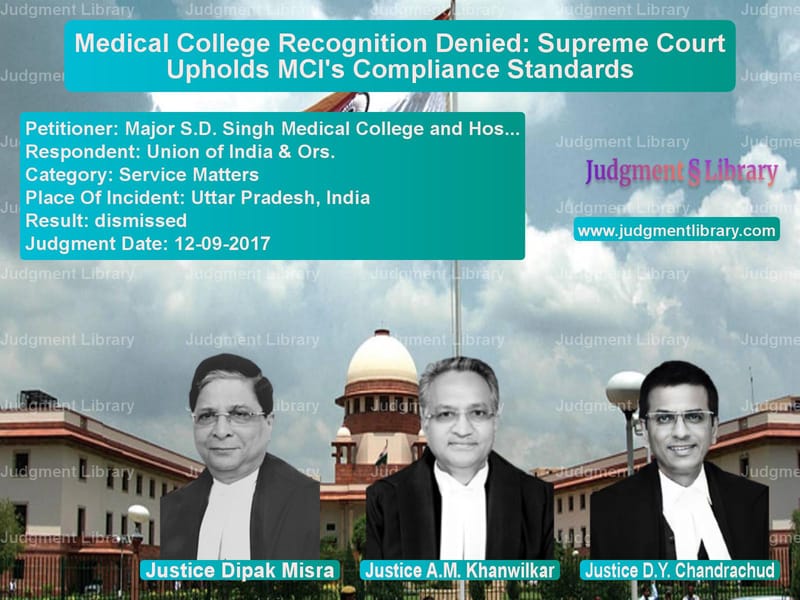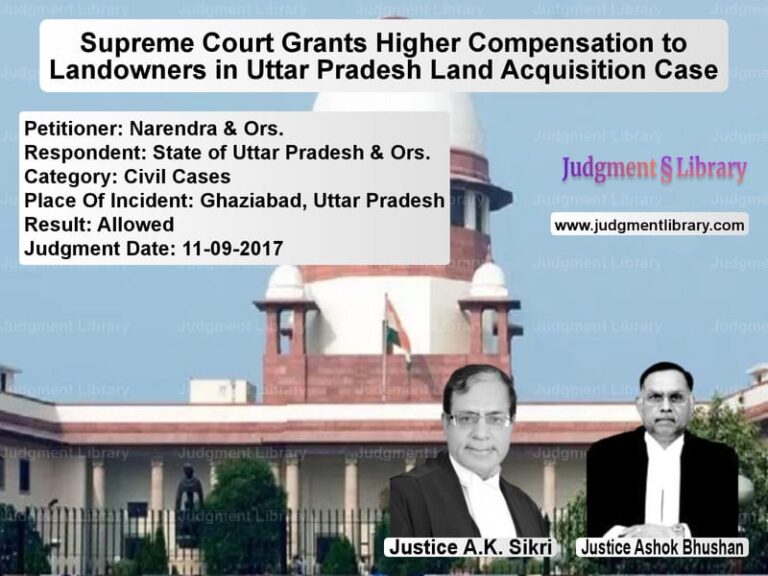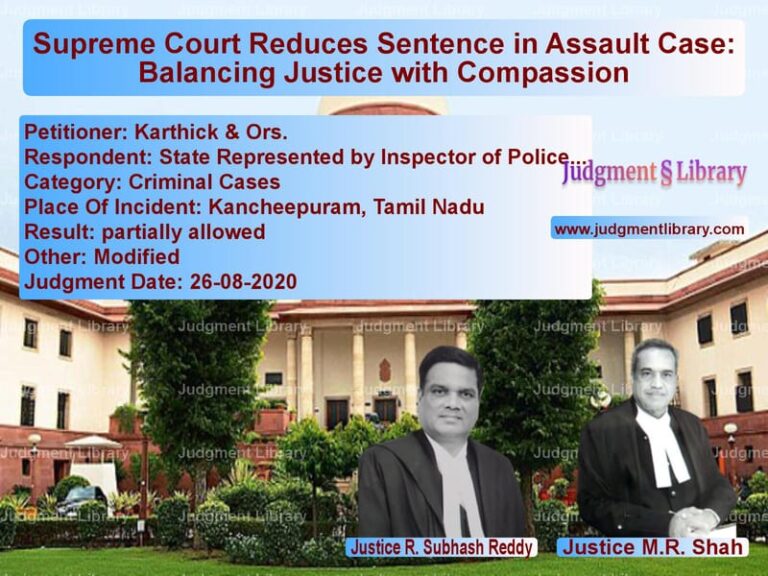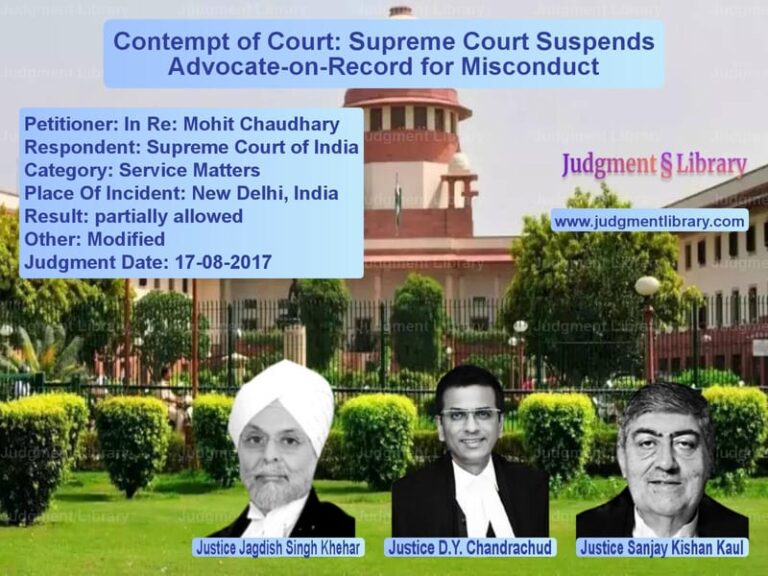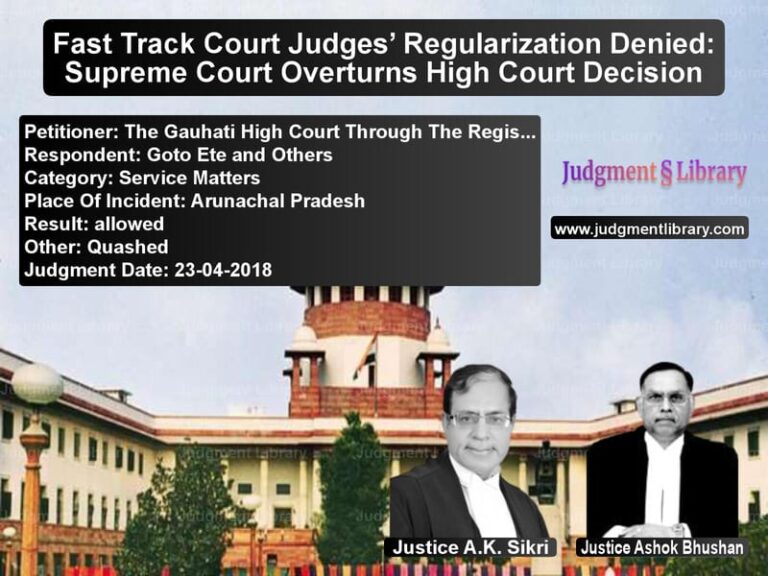Medical College Recognition Denied: Supreme Court Upholds MCI’s Compliance Standards
The case of Major S.D. Singh Medical College and Hospital v. Union of India & Ors. involved the denial of recognition to a medical college due to deficiencies in faculty, infrastructure, and hospital facilities. The Supreme Court, in its judgment dated September 12, 2017, upheld the decision of the Medical Council of India (MCI) and the Union Government to debar the institution from admitting students for two academic years.
Background of the Case
The petitioner, Major S.D. Singh Medical College and Hospital, was granted initial permission to admit students in 2011-12. Over the next few years, the college received conditional permissions but was denied renewal for the academic year 2015-16 due to serious deficiencies found in MCI inspections.
Subsequent inspections in 2016 and 2017 continued to highlight significant shortfalls, including:
- Deficiency of faculty exceeding 70%.
- Bed occupancy levels below the required threshold.
- Lack of essential medical facilities and infrastructure.
Based on these findings, the MCI recommended barring the institution from admitting students for 2017-18 and 2018-19 and encashing its bank guarantee of Rs. 2 crores. The Union Government upheld this recommendation, prompting the petitioner to challenge the decision before the Supreme Court.
Legal Issues
- Was the MCI justified in conducting multiple inspections and denying recognition?
- Did the Union Government follow due process in barring admissions?
- Could the Supreme Court intervene in regulatory decisions made by expert bodies?
Arguments by the Petitioner (Major S.D. Singh Medical College)
The petitioner contended:
- The inspections were arbitrary, and the findings were inconsistent.
- The college had rectified deficiencies, but the authorities failed to consider compliance reports.
- The order barring admissions was mechanical and did not provide proper reasoning.
- It was unfair to impose a two-year admission ban without giving the institution a fair chance to comply.
Arguments by the Respondents (Union of India & MCI)
The respondents argued:
- The institution failed to meet basic medical education standards despite multiple opportunities.
- Serious deficiencies persisted across multiple inspections, justifying the admission ban.
- Public interest required that medical institutions maintain high standards to ensure quality healthcare.
- The Supreme Court should not interfere in expert regulatory decisions unless there is clear evidence of arbitrariness.
Supreme Court’s Analysis
On the Legality of Multiple Inspections
The Court ruled that regulatory bodies like MCI have the authority to conduct multiple inspections when there are valid reasons to doubt an institution’s compliance. It stated:
“MCI is a custodian of public interest and acts in trust for the welfare of society. The verification of conditions prevailing in medical colleges is central to its role.”
On Due Process
The Court found that the institution had been given multiple opportunities to present its case but failed to provide satisfactory evidence of compliance. It noted:
“The petitioner was afforded a hearing, and its objections were considered. However, deficiencies continued to persist, warranting regulatory action.”
On the Two-Year Admission Ban
The Court upheld the government’s decision to debar the institution from admitting students for two years, emphasizing the importance of maintaining high standards in medical education. It stated:
“The court will lean against any interpretation which will result in the foisting of underprepared medical professionals on society.”
Final Judgment
The Supreme Court upheld the Union Government’s decision to deny recognition for 2017-18 and 2018-19 but provided the institution with an opportunity to seek recognition for 2018-19. It directed MCI to conduct a fresh inspection within two months and allow the institution to rectify deficiencies.
“The case of the petitioner shall be duly considered by MCI and the Union government in accordance with the prevalent regulations for academic year 2018-19.”
Conclusion and Impact
This ruling reinforces the principle that medical colleges must strictly adhere to regulatory requirements and that compliance failures will not be overlooked. It also upholds the authority of the MCI and the Central Government in ensuring quality medical education.
The judgment sets an important precedent:
- Regulatory bodies can conduct multiple inspections when there are valid concerns about compliance.
- Medical colleges must maintain high standards of faculty, infrastructure, and clinical facilities to ensure quality education.
- The Supreme Court will not lightly interfere in expert regulatory decisions unless there is clear evidence of arbitrariness.
By upholding the two-year admission ban, the Court has sent a strong message that medical institutions must comply with regulations in both letter and spirit to protect public health and maintain the integrity of medical education in India.
Don’t miss out on the full details! Download the complete judgment in PDF format below and gain valuable insights instantly!
Download Judgment: Major S.D. Singh Med vs Union of India & Ors Supreme Court of India Judgment Dated 12-09-2017.pdf
Direct Downlaod Judgment: Direct downlaod this Judgment
See all petitions in Recruitment Policies
See all petitions in Public Sector Employees
See all petitions in Legal Malpractice
See all petitions in Judgment by Dipak Misra
See all petitions in Judgment by A M Khanwilkar
See all petitions in Judgment by Dhananjaya Y Chandrachud
See all petitions in dismissed
See all petitions in supreme court of India judgments September 2017
See all petitions in 2017 judgments
See all posts in Service Matters Category
See all allowed petitions in Service Matters Category
See all Dismissed petitions in Service Matters Category
See all partially allowed petitions in Service Matters Category

